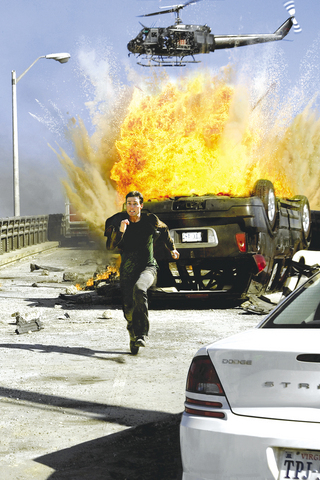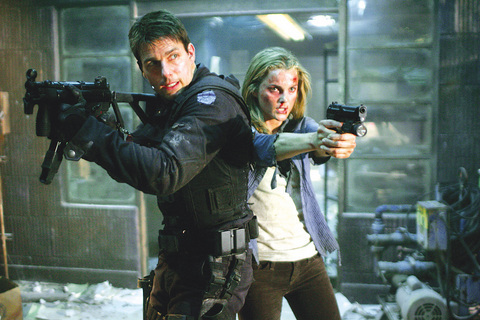A lot happens in the third Mission: Impossible. Little bombs are launched up folk's noses and into their brains. A gorgeous tangerine Lambor-ghini Diablo is cruelly blown to smith-ereens. And tremendous time and effort are devoted to chasing down the contents of what might be the most dangerous thermos in the history of movies.
Only theoretically, though, is this exciting. Mostly, it all feels like a lateral move that keeps alive a franchise without breaking new ground. The release of Mission: Impossible 3 marks the arrival of summer blockbusting. But the movie, directed and co-written by J.J. Abrams, the busybody creator of ABC's Alias and Lost, doesn't rise to the seasonal occasion so much as settle into it. In any Mission: Impossible, Tom Cruise has to plummet from some outrageous height only to dangle 15cm above the ground, and so he does.
Brian De Palma directed the first installment, in 1996, with a jolly indifference to a navigable plot. He'd made a subversive blockbuster that he knew was ridiculous. He was winking at us, yet it was exciting: helicopters flying through train tunnels. Four years later, John Woo handled the sequel, and he seemed to think it'd be fun to sleepwalk through the whole thing. It wasn't.

PHOTOS COURTESY OF UIP
Abrams's contribution is superior to Woo's in that he appears to be wide awake. But a decade after the first movie, that kind of ludicrousness just seems commonplace now -- thanks in large part to Abrams and his TV shows, where absurd confrontations are treated with a kind of reverence. To a significant extent, Alias is a tribute to the original Mission: Impossible television series. So in a sense, the pop cosmos would seem to demand that he direct one of these movies, as much as his agents would.
Abrams is almost too comfortable in this big-screen world of espionage. In Mission: Impossible: 3, a duel between helicopters set amid the propellers of a wind farm feels like business as usual. Isn't this the way action sequences have always been? The task seems to have inspired him merely to be extremely competent. He doesn't have many surprises for us.
The story seems especially ancient. In the six years since Mission: Impossible 2, Cruise's special agent Ethan Hunt has retired from fieldwork and is now just an instructor. He's engaged now, to a nice, tallish, dark-haired woman (Michelle Monaghan) who knows nothing about his double life but dotes on him anyway. (Boy, that seems familiar.) Domestic life suits him. But when an agent Ethan trained gets into trouble, he's pulled back in. Sigh.

Needless to say, the missing agent is the jumping-off point for a plot that leads straight to a porcine, global arms dealer named Owen Davian, who's played by Philip Seymour Hoffman.
Having spent most of last year riding high as the fragile, lisping Truman Capote, Hoffman seems content to be playing a virile basso profundo and out-and-out sadist who gets to talk Malkovich to Tom Cruise. "I'm gonna find her and I'm gonna hurt her," he growls, describing his plans for Ethan's ladylove. Hoffman is a backhanded delight. He's the last person you'd expect to be here. So watching him rough himself up, as he does in the best sequence in the whole movie, is clever and jokey: Hoffman on Hoffman, literally.
The rest of the cast is fun, too. It's a splendid and strange mix of actors. Jonathan Rhys Meyers, the reptilian climber from Woody Allen's Match Point; Keri Russell (who was the star of Felicity, Abrams's first TV show); and the American-born Asian movie star Maggie Q join the franchise's other mainstay, Ving Rhames, as Ethan's cohorts. Monaghan, the little-red-Corvette miner in North Country, seems like a nice young lady, even with duct tape over her mouth. Meanwhile, the thespians Laurence Fishburne and Billy Crudup work in the agency's front offices, where corruption lurks.
But they toil in the name of blandness. Could I have Summer Movie Fatigue one film in? A hail of bullets and a megastar falling out of the sky just seem part of the forecast. The filmmakers vowed this film would turn the spy-movie on its ear. But I didn't see a musical number anywhere.
If the pulse never quite races, the mind does boggle, especially during a demolition sequence on a suspended highway, complete with missiles, helicopters, and fighter jets. But did Abrams mean for it to evoke battles in Fallujah? Another time, Cruise writes out a long series of numbers on a window: Are those the projected box-office grosses?
Abrams does pledge familiar, seemingly contractual allegiance to Cruise's fitness. His T-shirts have short-short sleeves that reveal quivering veins in his biceps. His indestructible jeans relentlessly flatter his fanny. And the world's streets and pavements clear so he can sprint like a juiced-up cheetah. As usual, Cruise gives it his all. I love this man. But, sadly, not once during this movie was I moved to attack a sofa in his name.

June 2 to June 8 Taiwan’s woodcutters believe that if they see even one speck of red in their cooked rice, no matter how small, an accident is going to happen. Peng Chin-tian (彭錦田) swears that this has proven to be true at every stop during his decades-long career in the logging industry. Along with mining, timber harvesting was once considered the most dangerous profession in Taiwan. Not only were mishaps common during all stages of processing, it was difficult to transport the injured to get medical treatment. Many died during the arduous journey. Peng recounts some of his accidents in

“Why does Taiwan identity decline?”a group of researchers lead by University of Nevada political scientist Austin Wang (王宏恩) asked in a recent paper. After all, it is not difficult to explain the rise in Taiwanese identity after the early 1990s. But no model predicted its decline during the 2016-2018 period, they say. After testing various alternative explanations, Wang et al argue that the fall-off in Taiwanese identity during that period is related to voter hedging based on the performance of the Democratic Progressive Party (DPP). Since the DPP is perceived as the guardian of Taiwan identity, when it performs well,

A short walk beneath the dense Amazon canopy, the forest abruptly opens up. Fallen logs are rotting, the trees grow sparser and the temperature rises in places sunlight hits the ground. This is what 24 years of severe drought looks like in the world’s largest rainforest. But this patch of degraded forest, about the size of a soccer field, is a scientific experiment. Launched in 2000 by Brazilian and British scientists, Esecaflor — short for “Forest Drought Study Project” in Portuguese — set out to simulate a future in which the changing climate could deplete the Amazon of rainfall. It is

The Taiwan People’s Party (TPP) on May 18 held a rally in Taichung to mark the anniversary of President William Lai’s (賴清德) inauguration on May 20. The title of the rally could be loosely translated to “May 18 recall fraudulent goods” (518退貨ㄌㄨㄚˋ!). Unlike in English, where the terms are the same, “recall” (退貨) in this context refers to product recalls due to damaged, defective or fraudulent merchandise, not the political recalls (罷免) currently dominating the headlines. I attended the rally to determine if the impression was correct that the TPP under party Chairman Huang Kuo-Chang (黃國昌) had little of a